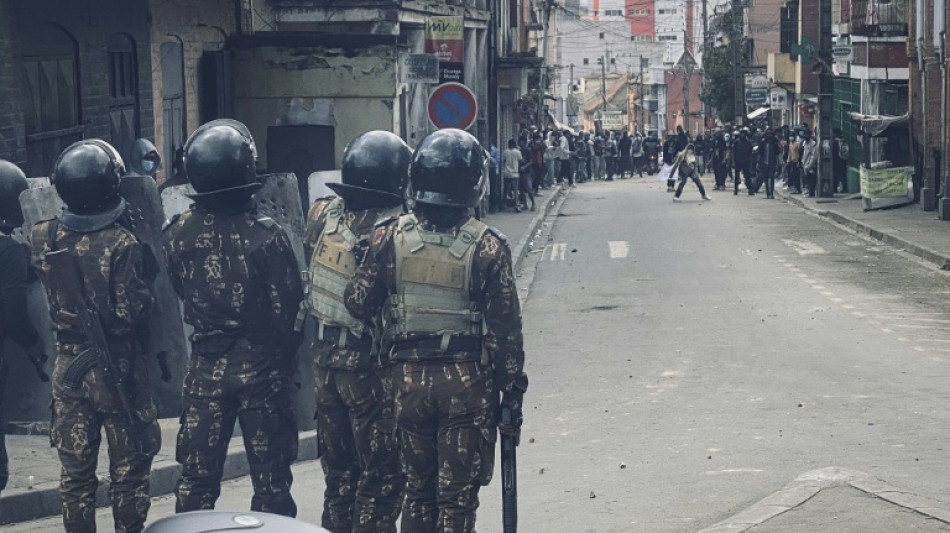
Madagascar's president denounces 'coup' attempt as protests flare

Madagascan President Andry Rajoelina condemned on Friday what he said was an attempt to topple his government, as fresh protests flared against the political elite and years of misrule.
The poverty-stricken Indian Ocean island has been rocked by near-daily demonstrations called on social media by a movement known as "Gen Z", to which security forces have responded with arrests, tear gas and bullets.
The protests forced Rajoelina to sack his government on Monday and invite dialogue to restore order.
But that was not enough to placate the anger, and demonstrators have demanded the president's resignation over his government's failure to reliably deliver basic services, including water and electricity.
"They have been exploited to provoke a coup," Rajoelina, 51, said in an online video in reference to the mostly young protesters.
"What I want to tell you is that some people want to destroy our country," he said, without naming whom he alleged was behind the move.
"Countries and agencies paid for this movement to get me out, not through elections, but for profit to take power like other African countries," Rajoelina continued in a live video on his Facebook page.
He also blamed a "cyberattack" for "mass manipulation".
Madagascar's foreign minister said the country faced "a massive cyberattack" and "targeted digital manipulation campaign" launched from another country.
"According to analyses by our specialised units, this operation was initially directed from abroad by an agency with advanced technological capabilities," minister Rasata Rafaravavitafika said.
She claimed that "opportunistic groups" had "infiltrated" the protests and aimed to "exploit the vulnerability of some of Madagascar's young people".
- 'Contempt' -
The Gen Z movement rejected Rajoelina's speech as "senseless", deploring his "contempt" for young people.
"We represent an angry people who can no longer be manipulated," they said in statements on social media.
They demanded to be "consulted and heard" in the choice of a new premier and calling for an investigation into the police crackdown.
The group vowed to take "all necessary measures" if the president did not "respond favourably" within 24 hours to its demands.
At least 22 people have been killed and hundreds injured since the protests started, according to the United Nations, a toll the government has denied as based on rumours or misinformation.
Protesters mobilised again on Friday in several neighbourhoods of the capital Antananarivo after a 24-hour "strategic" pause.
But the city centre remained under strict gridlock and a heavy security presence.
Police pickups sped through the city centre, AFP journalists saw, and security forces fired tear gas sporadically, while shops stayed shut along the capital's main Independence Avenue.
Students who were demonstrating in the northern coastal city of Mahajanga were also dispersed, according to local media.
In the south, protests were seen in the cities of Toliara and Fianarantsoa.
- Strike -
Customs personnel and prison staff unions announced a three-day strike, following previous calls for a general strike by several unions, including those representing national water and electricity workers.
In a rare show of unity, the political opposition has also thrown its support behind Gen Z.
The youth-led movement has adopted tactics seen in recent movements in Nepal, Indonesia and the Philippines, including the use of the pirate skull symbol from the Japanese anime series "One Piece".
The protests, which started on September 25, are the latest bout of unrest in Madagascar since independence from France in 1960, posing the most significant challenge yet to Rajoelina's tenure since his 2023 re-election.
The former mayor of Antananarivo first came to power in 2009 following a coup sparked by an uprising that ousted former president Marc Ravalomanana.
After sitting out the 2013 election under international pressure, Rajoelina was voted back into office in 2018 and re-elected in 2023 in contested polls.
Despite its natural resources, Madagascar remains among the world's poorest countries, with nearly 75 percent of its population of 32 million living below the poverty line in 2022, according to the World Bank.
Corruption is widespread, with the country ranking 140th out of 180 in Transparency International's index.
T.Hancock--TNT